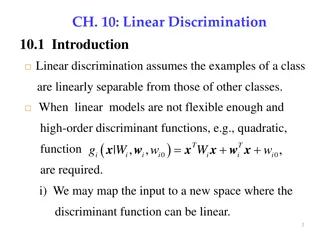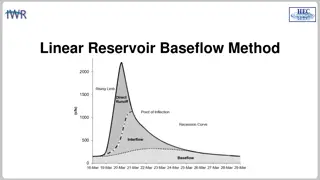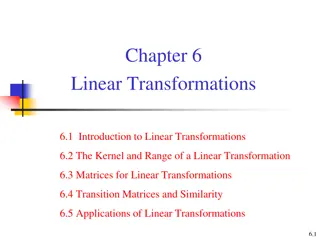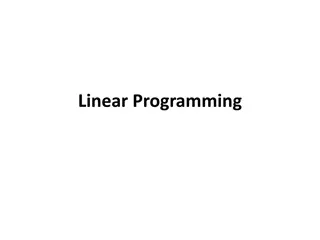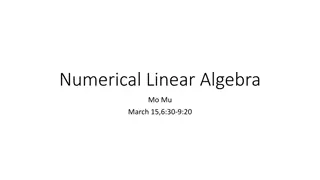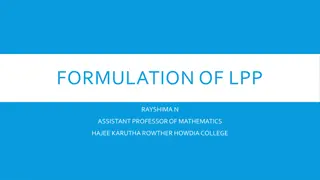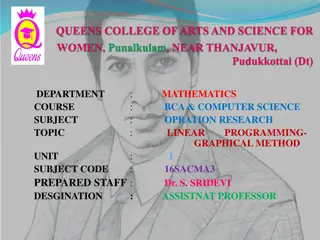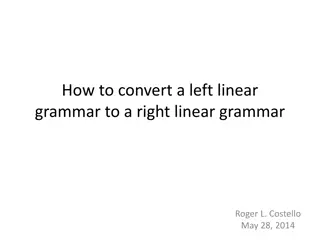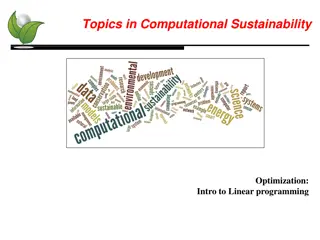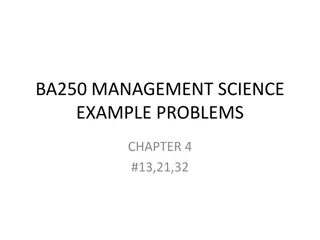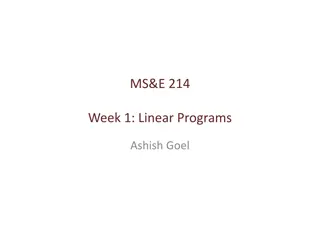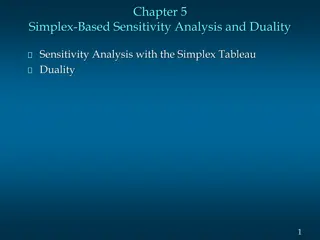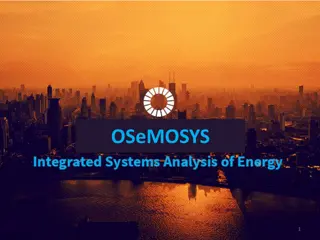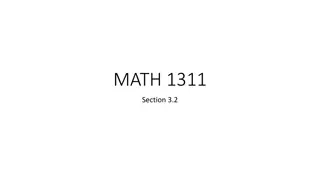Linear Programming: A Tool for Optimizing Business Operations
Explore the application of linear programming in business, as exemplified by the case study of San Miguel Corporation. Learn how linear programming models can help maximize profits, optimize resource allocation, and streamline decision-making processes in various industries. Discover the fundamental components and assumptions of linear programming, along with its real-world significance in solving complex business challenges.
Download Presentation

Please find below an Image/Link to download the presentation.
The content on the website is provided AS IS for your information and personal use only. It may not be sold, licensed, or shared on other websites without obtaining consent from the author.If you encounter any issues during the download, it is possible that the publisher has removed the file from their server.
You are allowed to download the files provided on this website for personal or commercial use, subject to the condition that they are used lawfully. All files are the property of their respective owners.
The content on the website is provided AS IS for your information and personal use only. It may not be sold, licensed, or shared on other websites without obtaining consent from the author.
E N D
Presentation Transcript
MANAGEMENT SCIENCE DR. HENDY TANNADY, ST, MT, MM, MBA. DEPARTMENT OF MANAGEMENT FACULTY OF HUMANITIES AND BUSINESS UNIVERSITAS PEMBANGUNAN JAYA
Linear Programming Week 2
CASE STUDY : SAN MIGUEL CORPORATION San Miguel Corporation the most diversified company in the Philippines, generates over 4% of that country s gross national product. San Miguel produces six brands of beer and bottles three wine and spirit brands at three different sites. Among its other endeavors are the manufacturing of packaging materials, such as glass containers, plastic crates, polybags, and cardboard boxes, and the development and manufacturing of animal feeds for its chicken, hog, and cattle interests. Other source of profit are the manufacture and distribution of ice cream, butter, cheese, and other dairy and nondiary products, the raising of prawns for export, and the processing and trading of coconut oil. Since 1971, management science, in general and linear models, in particular have had a significant impact on the company s bottom line. Projects in which linear models have played a major role include blending problems for determining animal feeds mixes and ice cream based composition, distribution problems for determining allocations among its 68 production facilities and 230 sales offices, and marketing problems, such as minimizing the cost of television advertising. Use these models has saved the company millions of dollars. By 1995, San Miguel had become the first non-Japanese and non- Australian firm to rank in the top 20 Asian food and beverage companies.
2.1 INTRODUCTION TO LINEAR PROGRAMMING LINEAR PROGRAMMING is a model that seeks to maximize or minimize a linear objective function subject to a set of linear constraints A constrained mathematical programming model consists of three components : 1. 2. 3. A set of decision variables that can be controlled or determined by the decision maker An objective function that is to be maximized or minimized A set of constraints that describe the restrictive set of conditions that must be satisfied by any solution to the model
2.1 INTRODUCTION TO LINEAR PROGRAMMING THE IMPORTANCE OF LINEAR PROGRAMMING 1. Many real world problems lend themselves to linear programming modeling. 2. Many real world problems can be approximated by linear models. 3. There are well-known successful applications in: Manufacturing Marketing Finance (investment) Advertising Agriculture
2.1 INTRODUCTION TO LINEAR PROGRAMMING Assumptions of the linear programming model The parameter values are known with certainty. The objective function and constraints exhibit constant returns to scale (Proportionality). There are no interactions between the decision variables (the additivity assumption).
2.2 A PROTOTYPE EXAMPLE GALAXY INDUSTRIES Galaxy Industries is an emerging toy manufacturing company that produces two space age water guns that are marketed nationwide, primarily to discount toy stores. The two models, the Space Ray and the Zapper, are produced in lots of one dozen each and are made exclusively from a special plastic compund. Two of limiting resources are the 1000 pounds of the special plastic compound and the 40 hours of production time that are available each week. Two of its recommendation from Marketing Department which has already accepted by Management, are to limit total weekly production to at most 700 dozen units and to prevent weekly production of Space Rays from exceeding that of Zappers by more than 350 dozen. Product Profit per Dozen Plastic (lb.) per Dozen Production Time (min.) per Dozen Space Ray $ 8 2 3 Zapper $ 5 1 4
2.2 A PROTOTYPE EXAMPLE DECISION VARIABLES X1 = number of dozen Space Rays produced weekly X2 = number of dozen Zappers produced weekly OBJECTIVE FUNCTION Maximize 8X1 + 5 X2 CONSTRAINTS 1. The availability of plastic 2. The weekly limit for production time 3. The maximum production limit of total units 4. The mix of Space Rays and Zappers Nonnegativity of Decision Variables = = = = = = 2 X1 + 1 X2 3 X1 + 4 X2 X1 + X2 X1 X1 - X2 X1 , X2 1000 2400 700 X2 + 350 350 0
2.2 A PROTOTYPE EXAMPLE THE MATHEMATICAL MODEL The complete mathematical model for Galaxy Industries is : (Total weekly profit) MAX 8X1 2X1 3X1 X1 X1 X1 + + + + - , 5X2 X2 4X2 X2 X2 X2 (Plastic) Constraints 1000 2400 700 350 (Production Time) (Total production) (Mix) (Nonnegativity) 0
2.3 A GRAPHICAL ANALYSIS X2 The non-negativity constraints X1
2.3 A GRAPHICAL ANALYSIS X2 The Plastic constraint 2X1+X2 1000 1000 700 Total production constraint: X1+X2 700 (redundant) 500 Infeasible Feasible Production Time 3X1+4X2 2400 X1 500 700 GRAPHICAL ANALYSIS THE FEASIBLE REGION
2.3 A GRAPHICAL ANALYSIS X2 The Plastic constraint 2X1+X2 1000 1000 700 Total production constraint: X1+X2 700 (redundant) 500 Infeasible Production mix constraint: X1-X2 350 Feasible Production Time 3X1+4X2 2400 X1 500 700 Interior points. Boundary points. Extreme points. There are three types of feasible points
SOLVING GRAPHICALLY FOR AN OPTIMAL SOLUTION
2.3 A GRAPHICAL ANALYSIS Start at some arbitrary profit, say profit = $2,000... Then increase the profit, if possible... X2 1000 ...and continue until it becomes infeasible 700 Profit =$4360 THE SEARCH FOR AN OPTIMAL SOLUTION 500 X1 500
2.3 A GRAPHICAL ANALYSIS Space Rays = 320 dozen Zappers = 360 dozen Profit This solution utilizes all the plastic and all the production hours. = $4360 Total production is only 680 (not 700). Space Rays production exceeds Zappers production by only 40 dozens. SUMMARY OF THE OPTIMAL SOLUTION
2.4 USING EXCEL SOLVER TO FIND AN OPTIMAL SOLUTION EXCEL
2.5 PROBLEMS Giapetto s Woodcarving Giapetto s Woodcarving, Inc., manufactures two types of wooden toys: soldiers and trains. A soldier sells for $27 and uses $10 worth of raw materials. Each soldier that is manufactured increases Giapetto s variable labor and overhead costs by $14. A train sells for $21 and uses $9 worth of raw materials. Each train built increases Giapetto s variable labor and overhead costs by $10. The manufacture of wooden soldiers and trains requires two types of skilled labor: carpentry and finishing. A soldier requires 2 hours of finishing labor and 1 hour of carpentry labor. A train requires 1 hour of finishing and 1 hour of carpentry labor. Each week, Giapetto can obtain all the needed raw material but only 100 finishing hours and 80 carpentry hours. Demand for trains is unlimited, but at most 40 soldiers are brought each week. Giapetto wants to maximize weekly profit (= revenues costs). Formulate a mathematical model of Giapetto s situation that can be used to maximize Giapetto s weekly profit.



